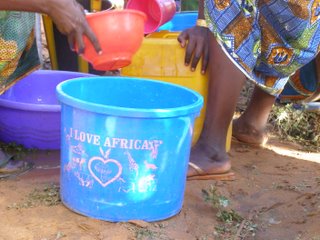Many people in Niger do not have running water from a tap in their homes or in the yards. They may have to walk miles to a well or water source to get a single bucket of water. In a town like Tera there is a water system. Water is pumped up from deep underground, treated, and sent to a tower. From there it is piped throughout the town. Every few blocks in town there is a public tap. People can go to the tap with their bucket, fill it up, and pay 10 francs (2 US cents).
It is usually the w
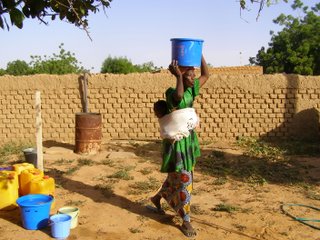 omen who go get the water and bring it home in buckets on their heads. In Tera they don't usually have to walk too far to get water, but in recent years we've had water shortages as the underground aquifers slowly dried up. In 2005, the last year we were in Tera before our year in the US, we had no running water in our house from January utnil June. We were at the end of the line and on a hill to boot, so our water pressure always went down first. We had to take are buckets and jerry cans to a pump a quarter of a mile away and leave them in line there, coming back several hours later to pick them up. We often had to do this two or three times a day. And that only covered our drinking and wash water. Think what this did for the Africans. They had to walk farther away to get water and carry the heavy load. Donkey and ox carts did a brisk business carrying barrels of water to thirsty households which often inclueded animals.
omen who go get the water and bring it home in buckets on their heads. In Tera they don't usually have to walk too far to get water, but in recent years we've had water shortages as the underground aquifers slowly dried up. In 2005, the last year we were in Tera before our year in the US, we had no running water in our house from January utnil June. We were at the end of the line and on a hill to boot, so our water pressure always went down first. We had to take are buckets and jerry cans to a pump a quarter of a mile away and leave them in line there, coming back several hours later to pick them up. We often had to do this two or three times a day. And that only covered our drinking and wash water. Think what this did for the Africans. They had to walk farther away to get water and carry the heavy load. Donkey and ox carts did a brisk business carrying barrels of water to thirsty households which often inclueded animals.Last year, the town of Tera dug some new wells, and that alleviated the water shortage, but did not completely solve the problem. There were still some water shortages last year, but they started later in the dry season (like February). We expect that we will have shortages again this year. What usually happens first is that we'll have low pressure or no pressure during the day, but we'll have water at night. We would then have to get up in the night to fill buckets, barrels, or whatever container we might have. Later, the pressure will start decreasing at night until it is only there early in the wee hours of the morning. Finally, we'll have no water at all.
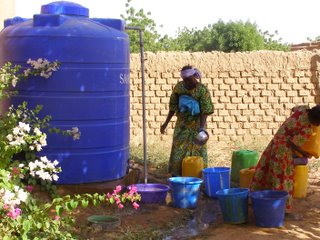
In order to alleviate stress and prevent us from having to go searching for water every day, we installed a big 2,000 gallon water tank with a pump in our yard. It has a float valve in it which cuts off when the tank is full. It pumps the water up into our pipes when the pressure is low. Best of all, it can fill up in the middle of the night without us having to get up. That way we'll have water the next day even when there is no pressure. As long as there's some pressure in the night, we should have water the next day.
There is spigot on the outside of the tank, so we can fill up buc
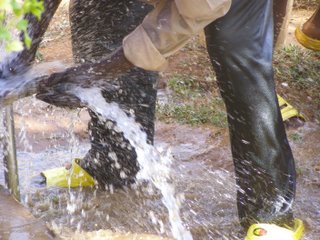 kets in the yard. Recently, water started leaking from around the spigot pipe where it goes into the tank. We called in a plumber, and the pipe came off the tank into his hands, spraying water everywhere. He said we needed to empty the tank so we could repair and clean it. We decided to do it then and there. But it would have been a waste to spill it all on the ground and have it go for nothing. So we invited the neighborhood women in for free water, and we also got some for ourselves. Nancy had planned to start her women's group that day, but we cancelled that and had a women's water party instead. It was great fun as all water broke loose and the tank was emptied.
kets in the yard. Recently, water started leaking from around the spigot pipe where it goes into the tank. We called in a plumber, and the pipe came off the tank into his hands, spraying water everywhere. He said we needed to empty the tank so we could repair and clean it. We decided to do it then and there. But it would have been a waste to spill it all on the ground and have it go for nothing. So we invited the neighborhood women in for free water, and we also got some for ourselves. Nancy had planned to start her women's group that day, but we cancelled that and had a women's water party instead. It was great fun as all water broke loose and the tank was emptied.All the women came in
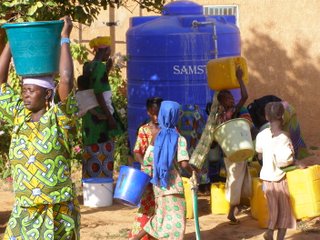 and were rejoicing over the free water.
and were rejoicing over the free water.Finally, I want to show you a picture of one of the buckets in the yard. Can you see what it says on it?
